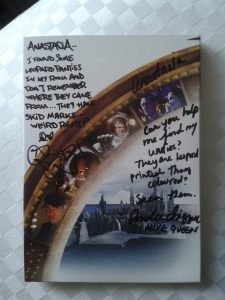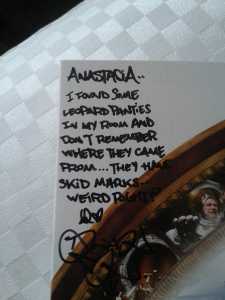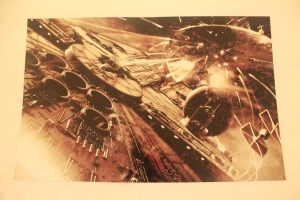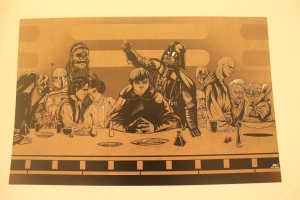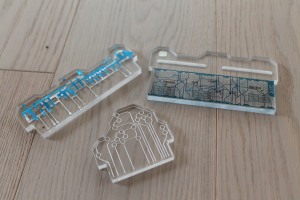Monthly Archives: September 2015
Happy Destiel Day!
Each ship chooses a particular day that is in some way special and memorable in the history of that ship, and that fandom – having to do with how it came into being and what it means. In the case of Star Trek, for example, I recently witnessed “Space Husbands” day a couple of days ago, on the anniversary of the airing of “Amok Time” – the Star Trek episode in which Spock essentially has to have sex and die and then rolls around in the sand with Kirk (no, I’m not kidding). With that kind of homoeroticism (thanks, Theodore Sturgeon!), who can avoid shipping the two?
Well, September 18th is considered by the Supernatural fandom – or at least that contingent of it that loves Dean/Cas – to be Destiel day. It was on September 18th, 2008, that Castiel first walked onto the show and told Dean “I’m the one that gripped you tight and raised you from perdition.” Now, this obviously sounds pretty…suggestive, and their relationship didn’t get any less suggestive after that. Instead, it blossomed and flourished. Dean taught Castiel what it meant to be human, what it’s like to have choice and free will, why people and families and life matters more than paradise. And Castiel taught Dean how to change his worldview, how to trust, how to have faith, and how to believe in himself. The two of them went on a journey from being faithless to having faith, thanks to each other – but not faith in God or some other supreme being that washes his hands of the Apocalypse. They learned to have faith in each other, and together they formed what we call a “profound bond.” They changed each other’s worldview in so many ways, and what else could I ask for in a ship?
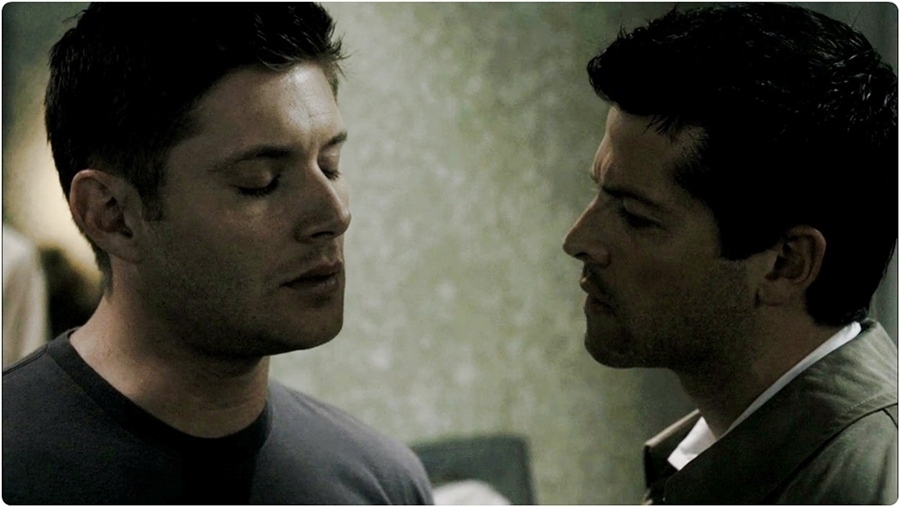
Their scenes together are really ridiculously suggestive, too.
I could wax poetic about these two for paragraphs, post many a screencap, analyze the romantic tropes in their relationship, talk about the representation of queer characters, explore how the relationship of these two ties into the themes of the show. Unfortunately, that would take way too long, so my small paragraph of waxing poetic will just have to do as a celebration of the profound bond between an angel and a human. So instead, I’ll leave you with a quote from the first page that comes up when you good “The greatest love story ever told”:
The story of a man afraid of flying, and an angel afraid of falling, who somehow met in the middle. The man who denied the existence of angels came to love one. The angel who never felt began to feel. The man who was saved from an eternity in Hell by an angel. The angel who fell in every way imaginable for a man. The man, with a clear path to escape, decided instead to stay in Purgatory for a year, searching for his angel, praying to him every night. Begging. When he found him, he held him; he told him that he needed him, that he’d get him out, even if it killed them both. The angel rejected his faith, his family, his home, and everything he knew, so he could keep the man safe. They stay together despite fate, despite what they are, because they refuse to be pulled apart.
Yes, that’s the top definition of Greatest Love Story Ever Told on Urban Dictionary. It’s the first thing that comes up when you Google it. I rest my case.
Chicago Stargate Convention 2015: Part 3
A little belatedly (and by a little I mean a lot), here’s a write-up of the last day of the con (in two parts).
Sunday started off with a panel with Rachel Luttrell and Paul McGillion, which Rainbow Sun Francks promptly joined (and refused to leave, not that anyone minded). This is the first time I’ve seen Rachel at a Stargate con in four years of going – she’s always had other commitments; I must admit, on my first watchthrough, I wasn’t a big fan of Teyla, though that’s changing slightly as I rewatch Atlantis. Still, I feel that with Teyla, there was a gap between what the writers intended intended (a strong woman and leader) and what actually happened (a character who consistently made badly thought-out decisions without foresight because the writers didn’t know what to do with a strong woman….which is a problem they strangely didn’t have with Weir). Partly due to this motivation, I asked Rachel, Paul, and Rainbow whether there was anything they’d chance about how their character had been written (besides dying, I added jokingly, as that’s something that happened to Ford and Beckett). Rainbow nonetheless said dying, but Rachel gave a more interesting answer: she talked about how interesting it was that Teyla came from what seemed like a matriarchal society, in which she was unquestionably a leader, and that there was a lot to explore about that kind of society and her role into it that the writers didn’t delve into as much as they could’ve. It’s an answer I agreed with – I’d have liked to see more of Teyla’s society, and more of her being a competent leader. In addition to this interesting answer, Rachel also graced us with some of her beautiful singing:
After that, I devoted much of the day to getting autographs with various celebrities who were offering them (and pointedly avoiding the Stargate novels panel) – quite a number of the celebrity guests were offering their autographs directly, which meant that I got to chat with them quite a bit, and in fact, have some mini-sagas to tell via autographs.
The first autograph I got was from Andee Frizzell – the Wraith Queen. Andee had been hanging around the hotel the entire weekend, interacting with guests, and we shared a fun moment when I walked out of the elevator to discover her and a bunch of people pointing confusedly at a thong lying on the floor. It was just there – no explanation, but a leopard-printed thong. I quickly snapped a picture of Andee making the most hilarious confused face as she pointed at it, though it’s a photo Andee would rather I not share (she gave me a lengthy talk about enjoying the con “in the moment” rather than spending it all snapping photos. I might disagree, but it’s a picture of her, so I’ll respect her wishes in the matter). In any case, the “thong saga” continued as I asked Andee to autograph my Stargate: Atlantis DVD set, on which I’m collecting the entire cast’s autographs. She wrote me a little message:
Later, I went to get Rainbow Sun Francks’ autograph (which required standing in line behind a gentleman who had made the most amazing Stargate replica). I asked him to sign the same DVD set, since he’s an Atlantis cast member, and the only season DVD in that set that had Rainbow on it was the same one Andee had signed – conveniently. So, of course, I recounted the whole saga to Rainbow so that he would understand why Andee was asking about her undies. Rainbow, of course, was amused, and totally went with it, penning this as his autograph (fun fact: he has the most neat, careful handwriting I’ve ever seen, but which also takes forever to write because it’s so neat and careful, so I swear, I stood there for five minutes waiting to get that autograph!):
I later stopped by Andee’s table again to show her the results of what she’d started and Rainbow’s contribution, which she found utterly hilarious. And who knows? Perhaps next year they’ll have another Atlantis celebrity guest who will sign that same DVD and wonder what’s going on with those undies.
But for the moment….I guess the secret is out. I left my undies in Rainbow’s room. And a few other things, too….
I also stopped by to get autographs from Suanne Braun (as I mentioned in a previous post) and Peter Williams. The two of them were doing their own “impromptu” photo op – you and your Goul’d overlords, because Creation isn’t very good at thinking of clever photo op combos – and of course I jumped on the opportunity to take a photo with two stunning, sexy deities (even though I had made one of them kneel the day before). We snapped a few photos, though I unphotogenically turned out terrible in all of them (although Suanne and Peter were pretty picky about how they turned out, which is why we snapped three – until Suanne and Peter were satisfied with how they looked, them photogenic people. I let it go. Me looking good in a photo isn’t going to happen).
I also had time over the three days of the con to stop by the vendors’ room extensively, spending more money than I probably should’ve. In my defense, I bought certain items that were of academic interest to me, which I can therefore justify as ‘research materials’ (to myself, at least) – for example, I bought a lot of concept art for Atlantis, as I’m working on some research on cities and spaceships in science-fiction, and thus studying the thought process behind the creation of Atlantis could be a useful resource.
But I also bought some more fun things, like some science-fiction prints for my collection of sci-fi art (of which I try to buy a piece at every convention I attend):
I also snagged a couple control crystals that were used on the set of Stargate as props, purchased from Stitch’s Loft- the same awesome people who had uniform replicas and concept art. Unfortunately David Hewlett wasn’t at the convention to sign one of them for me, but I’m keeping my fingers crossed that he’ll be at next year’s con so that Dr. Rodney McKay can sign one of my control crystals:
Then, it was time for the last couple panels of the day: Corin Nemec (with Cliff Simon, another con regular) and then Michael Shanks. I remember little from Corin’s panel, unfortunately, except that he was sweet and adorable. Michael’s panel was, of course, hilarious as always.
Michael Shanks is one of those actors that can evade questions like a politician while making you feel like he answered them, and simultaneously making everyone laugh so hard they’re crying (yes, it happened to me). Since Daniel Jackson is a really popular character who was around from the very beginning of SG-1, he’s obviously been doing cons and getting questions for a very long time – which means that he gets questions about miniscule details like “what was Daniel doing for the year he was ascended?” This led him to jokingly say “see, this is what happens when you have conventions for a show that’s been off the air for ten years!” Nonetheless, he answered the questions goodheartedly – even while fake-angrily asking “what am I, an expert on ascension?” when people wouldn’t stop asking him questions about ascension. And, of course, he used William Shatner’s trademark line of “you people need to get a life!” when it turned out that a good portion of the audience had seen Mega Snake, a TV movie that apparently was embarrassing enough that he doesn’t want to talk about it very much. (Of course, he meant it all goodheartedly, but his fake exasperation at some of the questions fans ask is just so much fun).
And that was the panels for the day! In my next, wrap-up, post I’ll talk about the photo ops I took that day, as well as some thoughts about actor-fan relationships in general.
The Past, Present, and Future of Sci-Fi in Philly: Geekadelphia Panel at the Free Library
A couple of days ago, I attended a panel at the Free Library of Philadelphia sponsored by Geekadelphia – Philadelphia’s geek blog. Gathering together local sci-fi authors, historians, and fans, the subject of the panel was the past, present, and future of science-fiction in Philadelphia, though the panel quickly evolved into a more broad discussion about the past, present, and future of the genre. Here’s a number of the interesting points raised at the panel, many of which bear further thinking about – and many of which, I think, have bearing on the various topics discussed on this blog.
You can read more about the various people on the panel at the event page here. Before I begin, I must also note that the panel took place at one of my favorite places in Philadelphia – and one of the most science fiction-y: the central branch of the Free Library. Located on the Parkway, this beautiful building has rows upon rows of science fiction books, often boasts guests like Kate Mulgrew (Katherine Janeway) and Chris Hadfield (an astronaut), and has an amazing roof deck with a gorgeous view of the city and its skyscrapers (and for me, the twinkling lights of a large city always evoke a sense of possibility that science fiction also gives me). Here’s a photo, taken on my phone:
On that note, the panel fittingly began with a question about the way that Philadelphia’s past is linked to science fiction. The first, and most intriguing answer, came from historian Siobhan Carroll, who suggested that we’re living in the decayed version of William Penn’s utopia. He designed Philadelphia to be this perfect city, laid out on a grid, and of course we’re living in the dystopian version of it:

Penn’s plan for Philadelphia.
We talked about dystopias quite a bit, with someone bringing up an interesting point: if someone is writing about their real, contemporary experiences and they’re dystopian, does that count as science fiction, or does that fit somewhere else on the spectrum of genres? If the experience is “real,” can it still be sci-fi – or do we put it in the biography and memoir section? (a question that is increasingly relevant given the state of affairs in the U.S. today- a question I will return to in another post). This led to a joke about a new (and utterly terrifying) genre: dystopian non-fiction (a genre that likely already exists, in the satires of Stephen Colbert and the like, but which really could bear more academic exploration).
This, naturally, brought up the topic of the relationship between the present and the future in science fiction, since most dystopias are set in the future (despite the dystopian potential of contemporary life). A question and concern that the panelists especially tackled was how far in the future an author must go to write science fiction. Especially with the pace with which technology is advancing today, where yesterday’s sci-fi rapidly becomes today’s technology, how far ahead should you think when you write sci-fi and how far in the future should you set your story? If you set it in the near future, do you run the risk of reality outpacing you?
This led to a comment made by one of the panelists that technology is advancing so fast today that it’s hard to keep up with it as a sci-fi author- things are becoming reality faster. This, though it wasn’t explicitly mentioned, is in line with a lot of thinking about technological advances: Ray Kurzweil and a number of transhumanist thinkers point out that technology advances at an exponential rate. That’s why they think we might eventually reach the Singularity – because of this exponential rise in technology, we’ll use technology to create better technology until we reach the Singularity. That, of course, places the sci fi author in a bit of a conundrum, because now there’s a shorter ‘timeline’ on the sci-fi things they write about and invent before they become “real.” Of course, as Michael Swanwick pointed out, even if you do thinking about inventions that then come to pass, your thinking wasn’t wasted, because science fiction is always about the implications and meaning of technology as much as the actual technology – and even if Google invents something before you write about it, those considerations will be valuable to your formation as a thinker and writer of science fiction.
This led to a funny story about William Gibson (of Neuromancer fame, of course), who attended a Worldcon sometime in the 70s or 80s and was given a card as the key to his room instead of an actual key. That was the moment, he insisted, at which he realized the stuff he was writing about was real.
Another thing we talked about is diversity – and, naturally, the ‘fiasco’ involving the Sad Puppies, Rabid Puppies, and this year’s Hugo awards. (For a quick summary, go here). The consensus seemed to be that what’s changing is not who writes sci-fi and fantasy (people of color and women and queer people have always written in the genre), but who gets noticed – and what kinds of stories they write. People who aren’t white men are increasingly getting noticed as writers in the genre and getting recognition and awards (like the Hugos). That’s what the Puppies are fighting against: that recognition, but the very fact that it’s noticeable and something for them to fight against means that change is happening, and progress has been made already. A very important aspect of this is the fact that diversity is not a “trend,” as many like to call it today – it’s more the realization of the importance of that diversity and its recognition when it does exist.
And to finish up, here’s some more fun tidbits about other connections to Philadelphia:
- Philcon was apparently the first sci-fi convention and, naturally, took place in Philadelphia
- Asimov and Heinlein and Delaney all lived in Philadelphia
- They were all also part of sci-fi-esque government-related think tanks.

